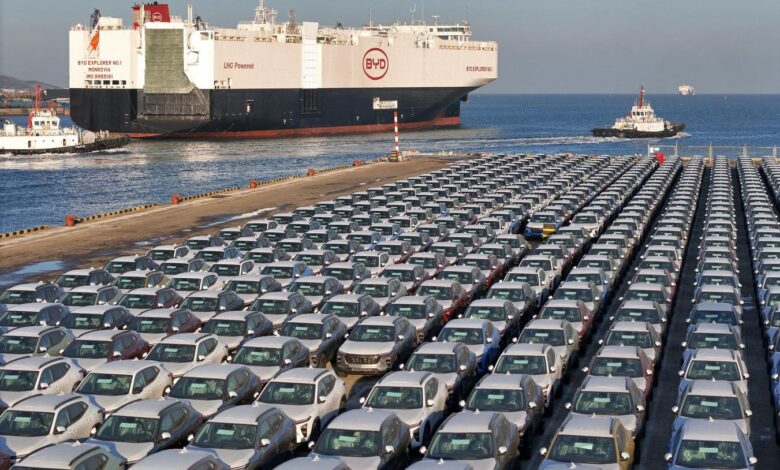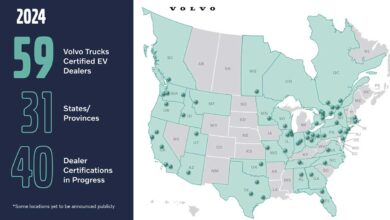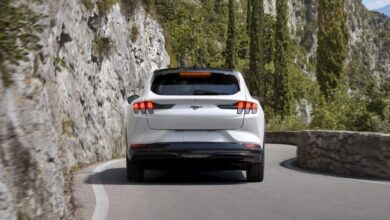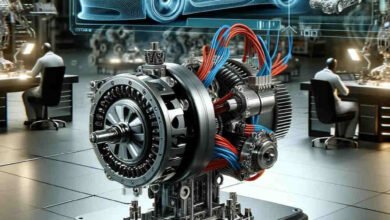EU Decision On China EV Import Tariffs Poses Harsh Questions

The photo taken on January 10, 2024 shows electric cars for export waiting to be loaded on the “BYD … [+]
The European Commission is expected to announce next week whether to impose provisional extra tariffs on China’s electric vehicle imports and it’s hard to exaggerate its importance, and scope for unintended consequences.
Cutting China’s EV sales in Europe would undermine important EU plans to end the sale of new gasoline and diesel vehicles by 2035. Allowing a big increase in Chinese EVs could pose an existential threat to its automakers but help make the 2035 targets. A threat to its automakers might undermine 2035 targets based on CO2 emissions.
The Commission announced last November it would probe alleged illegal subsidies by Chinese companies. The decision is expected June 10, a day after this weekend’s elections for the European Parliament which run from June 6 through June 9. Any decision taken by what would be an outgoing EU administration would be up for confirmation or amendment within the next four months.
If the Commission, the European Union’s executive, raises tariffs from the current 10% to try and curb Chinese EV sales, there’s a big danger of retaliation which would jeopardize German automakers like Porsche, BMW, Mercedes, VW and its upmarket Audi subsidiary. They make big money in China selling mainly internal combustion engine-powered vehicles.
Audi A6 e-tron concept car is on display during the Auto Guangzhou 2023. (Photo by Qu Jinwei/VCG via … [+]
HSBC Global Research said German manufacturers generate 20 to 23% of their global profits in China. Speculation about the size of new tariffs range from an increase to between 25 and 50%.
Not surprisingly, the German industry has been lauding the qualities of free trade and lobbying against tariff increases.
According to investment bank UBS, China has warned of a possible retaliatory 25% tariff on what would be mainly German ICE vehicles
If the Commission manages to cramp Chinese EV sales it will undermine its own plan to outlaw the sale of new ICE vehicles by 2035. When the EU hatched this plan it disregarded the fact that this drastic switch to EVs – from a quota of about 22% of new car sales this year, to 80% by 2030 and 100% by 2035 – couldn’t be met by European production. The Chinese were years ahead with EVs and their battery technology, and according to UBS, held a 30% efficiency advantage over Europeans.
Because of this superiority, Rhodium Group said last month the Commission would need to impose duties of 50% or more to seriously slow imports of electric vehicles from China.
If Chinese imports do accelerate and boost the zero new ICE vehicles plan, this will likely cause existential damage to its own domestic industry.
According to the European Automobile Manufacturers Association, the automotive industry provides direct and indirect jobs for 13 million Europeans, including 2.4 million manufacturing jobs.
HSBC Global Research said in a report published Thursday the tariff issue is a crucial marker for the European industry to address China‘s cost advantage. Previous EU decisions have shown a more lenient or free-market approach in the areas of solar panels and semiconductors.
Meanwhile the U.S. has announced 100% tariffs on Chinese EVs, so Europe will look like a tasty target for the likes of BYD, Geely and Great Wall Motors.
Currently, the majority of EVs built in China and exported to Europe are currently western, led by Tesla and including BMW. BYD has announced plans to localize EV making with a planned plant in Hungary. Other leading Chinese automakers are likely to follow suit. Last year Chinese brands sold just over 350,000 sedans and SUVs in Europe, mainly electric ones. SAIC’s MG led the way with 239,000 mainly EVs, about double 2022’s total. BYD sold about 16,000 and is mounting a big European sales effort.
“Chinese (manufacturers) are growing quickly in Europe, where they doubled their EV market share last year to 7%, and we expect 10% by 2025,” HSBC Research said in the report.
Washington-based Politico’s Brussels bureau said in a report that China has been “brandishing both carrot and stick” in a European diplomatic offensive to stop the EU from imposing more duties on Chinese cars – “duties that would be almost certain to trigger a tit-for-tat trade war”.
Politico said China has hinted that retaliation would aim at EU aviation and agriculture exports.
Investment researcher Evercore ISI said earlier this year Chinese automakers have a capacity of 40 million vehicles a year, and sales of only 30 million, prompting an energetic search for new foreign markets. Evercore ISI forecasts China will capture 10.1% of Europe’s EV sales by 2030.
Chinese local electric car prices can be as low as $10,000, while prices for EVs in Europe, even for so-called “affordable” ones, often start at around $27,000.
Last year Allianz Trade said Chinese-built EVs could cost European automakers €7 billion ($7.7 billion) a year in lost profits by 2030 unless the EU acts to either raise tariffs, boost battery and other technology, or persuade China to build cars in Europe. Allianz Trade is a subsidiary of German insurer Allianz.



